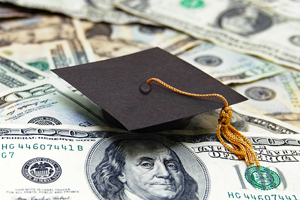
Paying off student loan debt
After mortgages, student loan debt is the second largest type of consumer debt. Federal student aid encompasses not only tuition and fees, but also housing and food, books and supplies, as well as transportation. Federal student loans, available through the government, offer a fixed interest rate that is often lower than private loans and much lower than interest rates associated with credit cards. Federal student aid is made available to students based on financial need. Conversely, private student loans are issued by banks and other financial institutions, require an application directly with the lending institution, and loan consideration is credit-based. Unlike federal student loans, interest accrues on private loans throughout the life of the loan and does not allow changes in the repayment plan after borrowing. Whether you are navigating the student loan process for the first time, or are a former college student, there are some things you should know about paying off your student loan debt.
Know your balance
As is true with any debt, you should know where to find your student loan balance and routinely keep track of your account and balance information. Federal student loan information can be found on the StudentAid.gov website. To find details about private student loans, log into the lender website or app. In the event you are unsure who services your student loans, check your credit report to review all loans issued in your name.
Pay more than the minimum
To reduce the amount of interest paid over the life of a loan, consider making more than the minimum payment each month toward your student loans. Paying a little extra can help you pay off your loans faster or have extra money allocated to student loans with higher interest rates. If you do not qualify for any type of federal student loan forgiveness, or you have limited options with private student loans and you have extra money, it makes sense to pay your student loans faster. Federal student loans, which do not require payment during the grace period or while you are still enrolled in school, continue to collect interest even when payments are delayed. If possible, try to make payments to cover at least the amount of interest accruing monthly during grace periods.
Loan forgiveness
Government-issued federal student loans may qualify for forgiveness. For example, if you repay your federal student loans under an Income-Driven Repayment (IDR) plan, a Pay As You Earn (PAYE) plan, or an Income-Contingent Repayment (ICR) plan, your student loans will be forgiven after 20 or 25 years of qualified repayments. There is currently no limit on the amount of forgiveness so long as the requirements are met. For those persons who work in public service, including federal, state, tribal, local government, and nonprofit organizations, federal loan forgiveness is also available. Under the Public Service Loan Forgiveness (PSLF) plan, the remaining balance on federal direct loans is forgiven once 120 qualifying payments have been made while working full-time for a qualified employer. Teacher loan forgiveness is available to those loan holders that have taught full-time for five consecutive years in a low-income elementary or secondary school, or education service agency. The newest forgiveness initiative, for borrowers enrolled in the Saving on a Valuable Education (SAVE) plan, is expected to be rolled out in February 2024. This repayment plan is expected to reduce federal student loan payments further and make it easier to manage repayment.
Total household debt
Student loan debt can affect your chances of buying a home and saving for retirement. What’s more, failure to make student loan payments can lower your credit score. As such, make every effort to pay back the loan responsibly within the agreed upon terms. Putting together your financial goals can help you understand and tackle your total household debt, including amounts attributable to student loans. Strive to make the minimum payments on all credit cards, private loans, and federal student loans to lower total household debt. When feasible, set aside an emergency fund that can serve as a buffer and assist with unexpected expenses. This cash savings can help you stay on track at paying down household debt and increasing your retirement savings over the long term.
About This Author

Alpine Bank Staff
Alpine Bank is an independent, employee-owned organization with headquarters in Glenwood Springs and banking offices across Colorado’s Western Slope, mountains and Front Range.
More about Alpine Bank Staff

